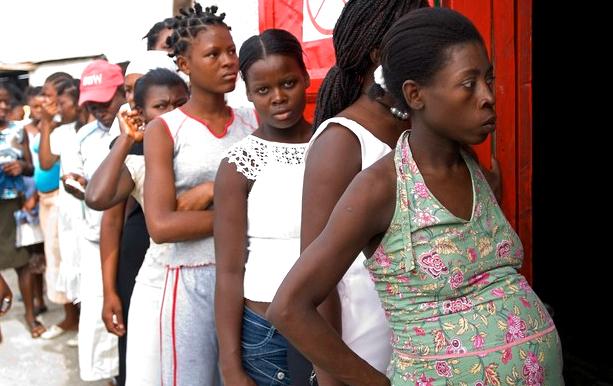
by Kaila Engle
In 2023, Haiti’s maternal mortality rate remained devastatingly high at 328 deaths per 100,000 live births, despite a slight decrease from 350 in 2020. This rate is nearly three times that of its Caribbean neighbors and reveals a stark regional disparity and a dire public health crisis. The Dominican Republic, Haiti’s next-door neighbor, has an estimated 124 deaths per 100,000 live births. Cuba has 35 deaths and Jamaica has 130, both of them neighboring Haiti in the Caribbean Sea. This comparison shows how drastic the maternal mortality in Haiti is in the region. The significant difference between Haiti and its neighboring nations serves as an urgent call for action. Contributing to these results is a lack of access to healthcare infrastructure and services, including hospitals for childbirth and medical staff. In 2016, it was found that only 38% of births in Haiti occurred in healthcare facilities, with the majority taking place at home. The need to give birth at home or be unable to get to a hospital comes from the widespread gang violence that has taken hold throughout Haiti and displaced hundreds of thousands of people. Gang violence has been prevalent in Haiti for decades, but it began to intensify after the assassination of Haiti’s president in 2021. Gang violence, which has plagued Haiti for decades, has surged after the 2021 assassination of its president. This violence has displaced hundreds of thousands, destroyed healthcare infrastructure, and limited the healthcare services available to pregnant Haitian women. UNICEF has found that in 2025, 85% of Haiti’s capital, Port-Au-Prince, is controlled by gangs.
To address the maternal mortality crisis going on in Haiti, the United Nations Population Fund (UNFPA) has implemented a variety of services to provide support for healthy deliveries. These services include the distribution of reproductive health medicines and equipment to the maternity hospitals, the deployment of mobile clinics, and the establishment of women’s safe spaces. In 2023 alone, 13,500 women were assisted during childbirth at UNFPA facilities. With President Trump’s withdrawal of funding from the UNFPA, their services in Haiti will be extremely strained, and the lives of thousands of Haitian women are under threat. The US was the main donor of the UNFPA, donating $161,663,042 in 2023. That support has kept the lights on in these healthcare facilities, provided mobile health services to women in need, and saved countless lives. With the loss of that funding, the UNFPA’s ability to provide these services will be reduced. In a country like Haiti, where healthcare is already scarce and difficult to access, this is a death sentence for thousands of women. The international community needs to take action to fill the gap from this loss in funding.
The international community must step up to fill the gap left by the US funding withdrawal. UNFPA’s loss of support will impact vital services worldwide, but nowhere more urgently than in Haiti, where the consequences could be catastrophic. An estimated 150-170 people visit the UNFPA’s medical clinics in Haiti. As well as from November 2024 to January 2025, UNFPA had assisted over 666 deliveries, including cesarean procedures, in Haiti. In 2023, 13,500 women were assisted during childbirth at UNFPA facilities. These services offer pivotal support to the community and address the maternal mortality epidemic in the region. With the loss of funding, the outreach of these services is going to be limited, especially as pregnancies continue to emerge. UNICEF has also concluded that there has been a 1,000% increase in sexual violence towards children in Haiti, specifically young girls. Doctors have noted a surge in pregnancies, teen pregnancies specifically, linked to the rise in sexual violence, which could further exacerbate maternal health issues. Already lacking the proper access to healthcare, the anticipation of more pregnancies, and a loss in the funding for pivotal resources to help them give birth, is going to be very bad for the already rampant maternal mortality problem in Haiti.
If the international community does not act swiftly to fill this gap, we are not just talking about a temporary setback in Haiti’s healthcare system. We are talking about the unraveling of progress that saves thousands of lives every year. The situation is urgent, and the consequences of inaction are too severe to ignore. The world must step up. The loss of funding from the US is a setback, but it should not be the final word. Other nations, international organizations, and private stakeholders must recognize the humanitarian responsibility at stake and step in to ensure that women in Haiti have access to the healthcare they need to survive and thrive. The fight for maternal health in Haiti is not just a local issue; it’s a global one. And it is up to the global community to ensure that the lives of these women are not expendable.
Kaila Engle is a School of Diplomacy student who participated in the UN Field Seminar course in the Spring 2025 semester.